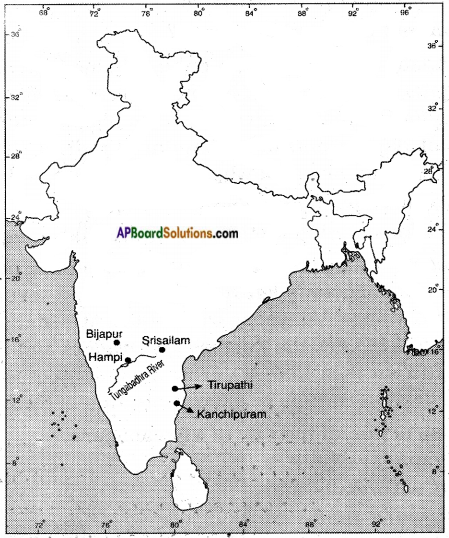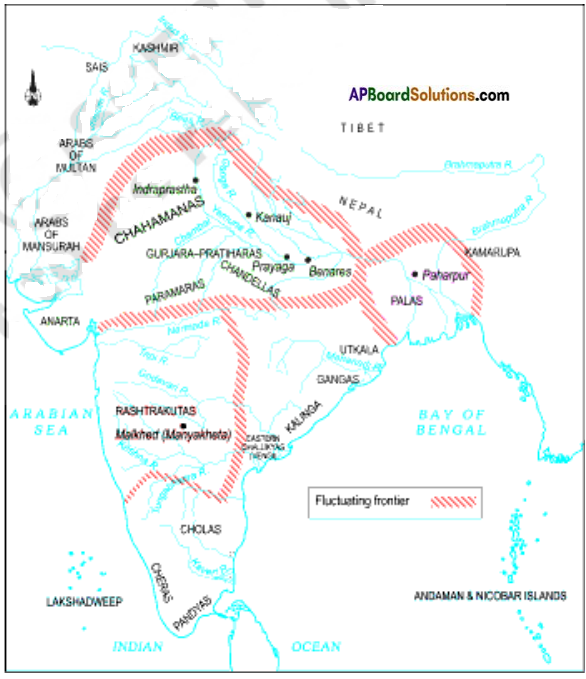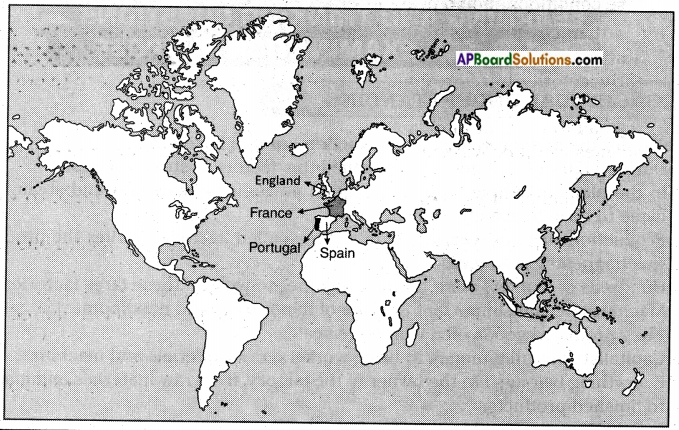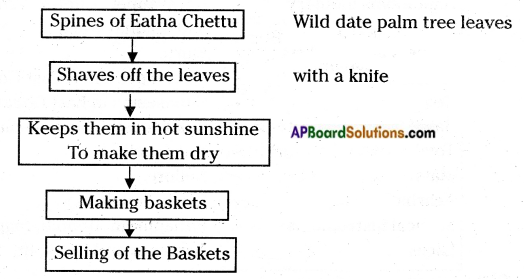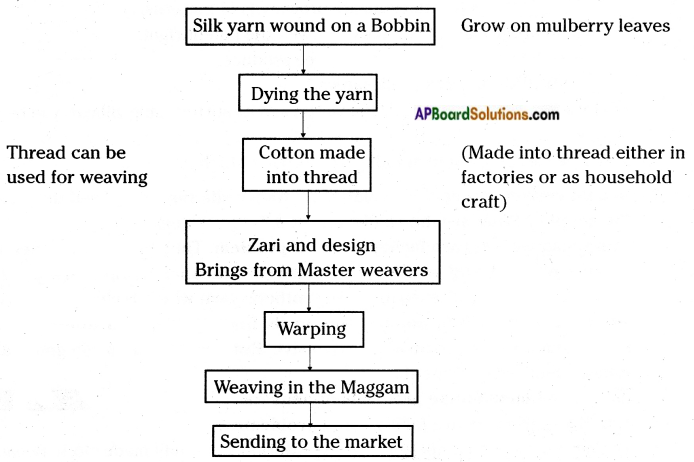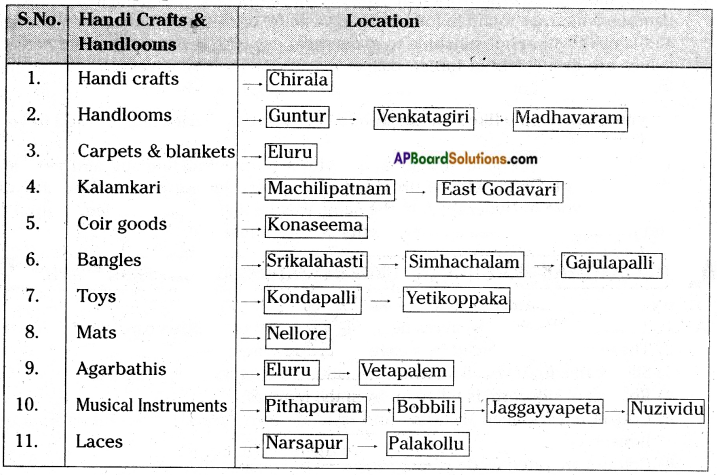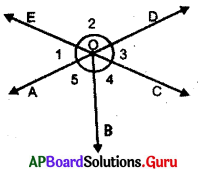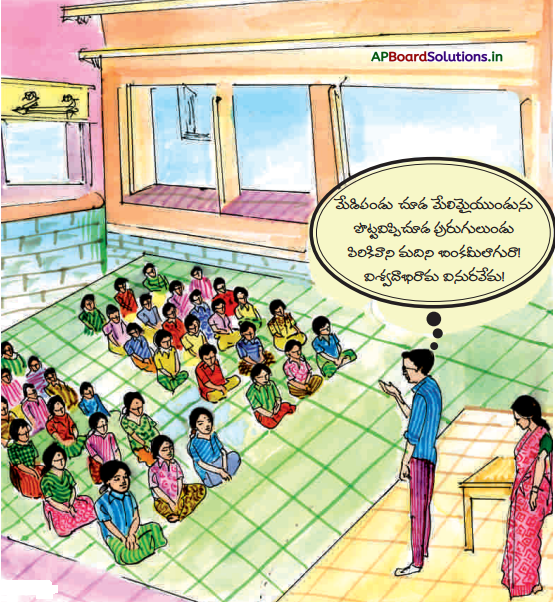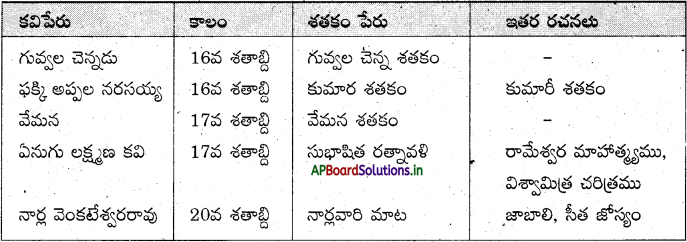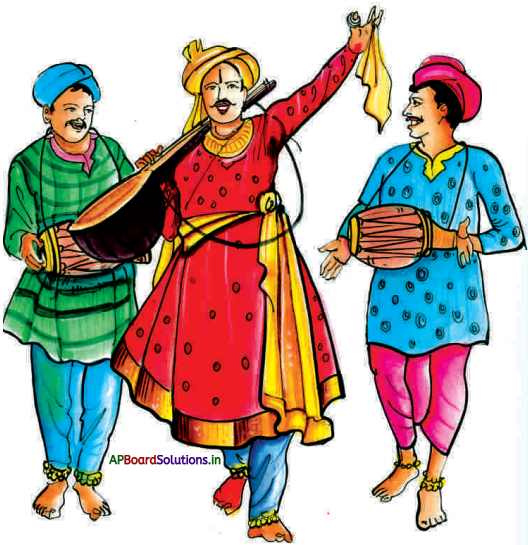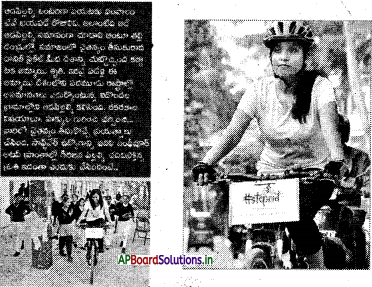SCERT AP State 7th Class Telugu Textbook Solutions 1st Lesson శ్రీలు పొంగిన జీవగడ్డ Questions and Answers.
AP State Syllabus 7th Class Telugu Solutions 1st Lesson శ్రీలు పొంగిన జీవగడ్డ
7th Class Telugu 1st Lesson శ్రీలు పొంగిన జీవగడ్డ Textbook Questions and Answers
ఆలోచించండి – మాట్లాడండి
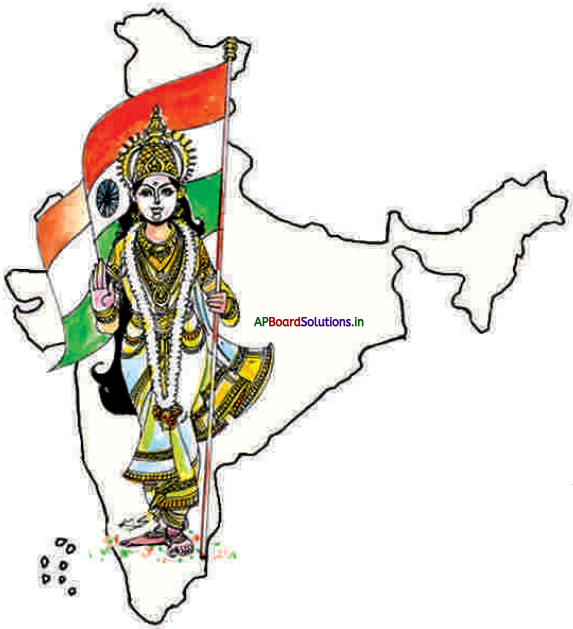
“ఏ దేశమేగినా ఎందు కాలిడినా
ఏ పీఠమెక్కినా ఎవ్వరెదురైనా
పొగడరా నీ తల్లి భూమి భారతిని
నిలుపరా నీ జాతి నిండు గౌరవము”
ప్రశ్నలు జవాబులు
ప్రశ్న1.
పై మాటలు దేని గురించి చెప్తున్నాయి?
జవాబు:
పై మాటలు మన జన్మభూమి అయిన భారతదేశం గురించి చెప్తున్నాయి. ..
2. దేశం పట్ల ఎటువంటి భావనతో ఉండాలి?
జవాబు:
దేశం పట్ల భక్తి, గౌరవ భావనలతో ఉండాలి.
3. జాతి గౌరవం నిలపడం అంటే మీరు ఏమనుకుంటున్నారు?
జవాబు:
- ఆ జాతి జనుల ప్రాచీన వైభవాన్ని గుర్తించి, కీర్తించాలి.
- ఆ జాతి జనుల సంస్కృతీ సంప్రదాయాలను ఆదరించాలి.
- ఆ జాతి జనుల ఆధ్యాత్మిక ఘనతను గ్రహించాలి.
- ఆ జాతి జనులకు వారసునిగా తాము నిలబడాలి.
4. మీకు తెలిసిన దేశభక్తి గేయాలను పాడండి.
జవాబు:
విద్యార్థులు కొన్ని గేయాలను అభ్యసించగలరు.
ఇవి చేయండి
I. వినడం – మాట్లాడడం
ప్రశ్న 1.
ఈ గేయం దేన్ని గురించి చెప్తోంది ? దీనిలో దేశభక్తికి సంబంధించిన విషయాలు ఏమేమి ఉన్నాయి?
జవాబు:
a) 1) ఈ గేయం భారతదేశం యొక్క గొప్పతనాన్ని గురించి చెప్తోంది.
2) భారతీయులు, భారతదేశంలో పుట్టిన మహాకవులను గూర్చి, “వీరులైన రాజులను గురించి, భారతదేశాన్ని గురించి గానం చేయాలని ఈ గేయం చెప్తోంది.
b) దీనిలో దేశభక్తికి సంబంధించిన విషయాలు :
- మన భారతదేశం పాడిపంటలకు నిలయమైన సిరిసంపదలు గల దేశం.
- భారతదేశంలో వేదాలు, రామాయణం, వ్యాసుని వంటి ఋషులు జన్మించారు.
- నవరసాలతో, వీనుల విందుగా కవిత్వం చెప్పిన మహా కవులు భారతదేశంలో ఉన్నారు.
- భారతదేశంలో ఎందరో ధీరులు, పాండవుల వంటి వీరులు పుట్టారు.
- కాకతీయులు, విజయనగర చక్రవర్తులు వంటి గొప్పరాజులు భారతదేశాన్ని పాలించారు.

ప్రశ్న 2.
ఈ గేయాన్ని రాగయుక్తంగా పాడండి. సారాంశాన్ని సొంతమాటల్లో చెప్పండి.
జవాబు:
ఉపాధ్యాయుల సహాయంతో రాగయుక్తంగా పాడటం నేర్చుకోవాలి.. మన భారతదేశం సంపదలు గల దేశం. పాడిపంటలు గల భాగ్యదేశం. ఇది వేదాలు, రామాయణం, వ్యాసుడు పుట్టిన పుణ్యభూమి. ఇక్కడ పెద్ద అరణ్యాలు ఉన్నాయి. ఇక్కడ ఉపనిషత్తులు పుట్టాయి.
మన రాజుల.పరాక్రమ చరిత్రలు, మన బానిసత్వం వల్ల నశించాయి. కిన్నెర మీటుతూ, రాళ్ళను కరగించే రాగంతో, భావి భారతదేశ భాగ్యాన్ని గూర్చి పాడుకోవాలి. నవరసాలతో వీనుల విందుగా కవిత్వం చెప్పిన కవులను గౌరవించాలి.
” దేశ గౌరవాన్నీ, దేశ చరిత్రను విస్తరింపజేసిన వీరపురుషులను కీర్తించాలి. పాండవుల కురుక్షేత్ర యుద్ధాన్ని గూర్చి చక్కని తెలుగు మాటలతో పాడుకోవాలి. కాకతీయుల యుద్ధనైపుణ్యాన్ని కీర్తించాలి. చెక్కుచెదరని విజయనగర రాజుల చరిత్రలను పాడుకోవాలి.
ప్రశ్న 3.
భారతదేశాన్ని ‘పుణ్యభూమి’ అని ఎందుకన్నారు?
జవాబు:
భారతదేశంలో వేదశాఖలూ, ఆదికావ్యం రామాయణమూ, వ్యాసుని వంటి ఋషులూ, ఉపనిషత్తులూ పుట్టాయి. అందువల్ల భారతదేశాన్ని పుణ్యభూమి అని అన్నారు.
ప్రశ్న 4.
దేశ గౌరవాన్ని పెంచిన భారతీయ వీరుల గురించి చెప్పండి.
జవాబు:
పాండవులు, కాకతీయ చక్రవర్తులు, విజయనగర చక్రవర్తులు, శివాజీ, పృథ్వీరాజు మొదలయినవారు భారతీయ వీరులు.
II చదవడం – రాయడం
ప్రశ్న 1.
ఈ గేయంలో మన భారతదేశం అని తెలిపే పదాలను గుర్తించండి.
జవాబు:
- శ్రీలు పొంగిన “జీవగడ్డ”
- పాలు పారిన “భాగ్యసీమ”
- “భరత ఖండము”
- విపుల తత్త్వము విస్తరించిన “విమల తలము”
– పైన చెప్పిన నాలుగు మాటలు, గేయంలో భారతదేశాన్ని గూర్చి తెలుపుతున్న పదాలు.
ప్రశ్న 2.
ఈ కింది మాటల క్రమాన్ని సరిచేస్తే గేయంలోని పాదాలుగా అవుతాయి. సరిచేసి రాయండి. భావం చెప్పండి.
“దీప్తి దేశ చెందగ గర్వము
చరితము దేశ తేజరిల్లగ
ధీర దేశ పురుషుల మరసిన
తమ్ముడా ! పాడర తెలిసి.”
జవాబు:
గేయ సవరణ ఇలా ఉండాలి.
“దేశ గర్వము దీప్తిచెందగ
దేశ చరితము తేజరిల్లగ
దేశమరసిన ధీరపురుషుల
తెలిసి పాడర తమ్ముడా !
పై గేయానికి భావం :
దేశ గౌరవం ప్రకాశించేటట్లుగా, దేశచరిత్ర విస్తరించేటట్లుగా, దేశాన్ని కాపాడిన వీరపురుషులను – గురించి తెలుసుకొని కీర్తించాలి.
ప్రశ్న 3.
ఈ కింది భావం వచ్చే వాక్యాలు గేయంలో ఎక్కడ ఉన్నాయో చూసి రాయండి.
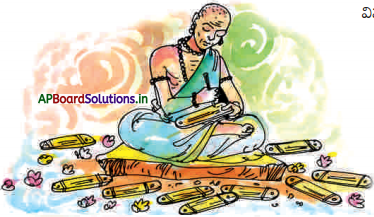
అ) మన దేశం వేదాలకు పుట్టినిల్లు.
జవాబు:
“వేద శాఖలు వెలిసె నిచ్చట.”
ఆ) కాకతీయుల యుద్ధ నైపుణ్యం.
జవాబు:
“కాకతీయుల కదనపాండితి.”
ఇ) లేత మాటలు చెవుల కింపుగ.
జవాబు:
“చివురు పలుకులు చెవుల విందుగ.”
ఈ) ఉపనిషత్తులు ఇక్కడే పుట్టాయి.
జవాబు:
“ఉపనిషన్మధు వొలికె నిచ్చట.”

ప్రశ్న 4.
ఈ కింది ప్రశ్నలకు గేయం ఆధారంగా జవాబులు రాయండి..
అ) పాఠానికి ఇంకొక శీర్షికను నిర్ణయించండి.
జవాబు:
“భారతదేశం” – అన్నది ఈ గేయానికి తగిన మరొక శీర్షిక.
ఆ) మన దేశం పవిత్రభూమి ఎందుకయింది?
జవాబు:
వేదాలూ, వేదాంగాలూ ఈ దేశంలో వెలిశాయి. ఆదికావ్యం రామాయణం ఇక్కడే పుట్టింది. భారత భాగవతాలు
రచించిన వేదవ్యాసుడు ఇక్కడే పుట్టాడు. ఉపనిషత్తులూ, తత్త్వబోధన ఇక్కడే విస్తరించాయి. ధర్మసూత్ర రచన ఇక్కడే జరిగింది. పై కారణాల వల్ల మనదేశం పవిత్రభూమి అయ్యింది.
ఇ) భావి భారతపదాన్ని ఏ విధంగా పాడాలి?
జవాబు:
కిన్నెర వాద్యాన్ని మీటుతూ, రాళ్ళను కూడా కరగించగల రాగంతో బిగ్గరగా, పాలవలె తియ్యనైన భావిభారత పదాన్ని పాడాలి.
ఈ) కవి గేయంలో వేటిని గురించి పాడాలని అన్నారు?
జవాబు:
- భావి భారత పదాన్ని గురించి పాడాలని చెప్పారు.
- దేశాన్ని కాపాడిన వీరపురుషులను గూర్చి పాడాలని చెప్పారు.
- పాండవేయుల యుద్దగాథను గూర్చి పాడాలని చెప్పారు.
- కాకతీయుల యుద్ధ నైపుణ్యాన్ని గూర్చి పాడాలని చెప్పారు.
- తెలుగు రాజుల చరిత్రలను గానం చేయాలని చెప్పారు.
III. స్వీయరచన
ప్రశ్న 1.
కింది ప్రశ్నలకు ఐదేసి పంక్తులలో సమాధానాలు రాయండి.
అ) భారతదేశాన్ని కాపాడిన కొందరు వీరపురుషులను గురించి తెలపండి.
జవాబు:
- శివాజీ
- ఝాన్సీ లక్ష్మీబాయి
- రాణీ రుద్రమదేవి
- శ్రీకృష్ణదేవరాయలు
- పృథ్వీరాజు
- ప్రతాపరుద్రుడు
వంటి వీర పురుషులు భారతదేశాన్ని కాపాడారు.
ఆ) యుద్దాలు ఎందుకు చేస్తారు? యుద్ధాల వల్ల లాభమా? నష్టమా? ఎందువల్ల?
జవాబు:
- ఇతరుల రాజ్యాన్ని స్వాధీనం చేసుకోడానికీ, తమ దేశాన్ని శత్రువుల నుండి కాపాడుకోడానికి సామాన్యంగా ఎవరైనా యుద్దాలు చేస్తారు.
- యుద్ధాల వల్ల లాభం ఎప్పుడూ ఉండదు. నష్టమే ఉంటుంది.
- యుద్దాల వల్ల ప్రాణనష్టం జరుగుతుంది. రెండు పక్షాలలోని సైనికులూ మరణిస్తారు. యుద్ధసామగ్రికి చాలా ఖర్చు అవుతుంది. యుద్ధంలో నష్టపోయిన దేశాలను బాగుచేయడానికి ఎంతో ఖర్చూ, కాలమూ వ్యయమవుతుంది.
- దేశాలన్నీ స్నేహంగా ఉండి, యుద్ధాలు చేయకపోతే, ఆ ధనంతో ఆయా దేశాలు తమ దేశాలను అభివృద్ధి చేసుకోవచ్చు.
ఇ) “బానిసతనం” అంటే ఏమిటి?
జవాబు:
బానిసతనం అంటే దాస్యం. తమకు స్వేచ్ఛ, స్వాతంత్ర్యం లేకపోవడం, ఇతరుల చెప్పుచేతలలో పడియుండడం ‘అన్నదే బానిసతనం. మన దేశానికి స్వాతంత్ర్యం రాకముందు, మన దేశం బ్రిటిష్ వారి చెప్పుచేతలలో ఉండి, బానిసత్వంను అనుభవించింది. మన అభిప్రాయాన్ని స్వేచ్ఛగా పైకి చెప్పుకోలేకపోవడం కూడా బానిసత్వమే.
ఈ) “భరత ఖండం” భాగ్యసీమ అనటానికి గల కారణాలు తెలపండి.
జవాబు:
మన భరత ఖండం, శ్రీలు పొంగిన జీవగడ్డ. పాలు పారిన భాగ్యసీమ. మనదేశంలో విశాలమైన పంటభూములు, గంగా గోదావరీ వంటి జీవనదులు ఉన్నాయి. పంటలను పండించడానికి కావలసిన మానవ వనరులు ఉన్నాయి. మనదేశంలో పరిశ్రమలు స్థాపించడానికి కావలసిన లోహాలు, అరణ్యాలు ఉన్నాయి. ఇక్కడ ముడిసరుకు, . కూలీలు దొరుకుతారు. బుద్ధిమంతులైన యువకులు ఉన్నారు. కాబట్టి మన భరతఖండాన్ని భాగ్యసీమ అని చెప్పవచ్చు.
ఉ) రాయప్రోలు సుబ్బారావు గారిని మీ మాటల్లో పరిచయం చేయండి.
(లేదా)
‘భరతఖండం – భాగ్యసీమని’ – ఎలుగెత్తి పాడిన రాయప్రోలు సుబ్బారావును గూర్చి రాయండి.
జవాబు:
‘శ్రీలు పొంగిన జీవగడ్డ’ గేయాన్ని శ్రీ రాయప్రోలు సుబ్బారావు గారు రచించారు. వీరు 1892లో గుంటూరు జిల్లా గార్లపాడులో జన్మించారు. వీరు తృణకంకణం, కష్టకమల, స్నేహలత, స్వప్నకుమార మొదలయిన భావ కవిత్వ కావ్యాలు రాశారు. ఆంధ్రావని, జడకుచ్చులు, వనమాల అనే ఖండకావ్యాలను; ‘రమ్యాలోకం’ అనే లక్షణ గ్రంథాన్ని రచించారు.

ప్రశ్న 2.
కింది ప్రశ్నకు పదేసి పంక్తులలో సమాధానం రాయండి.
అ) భారతదేశం గొప్పతనాన్ని గురించి మీ సొంతమాటలలో రాయండి.
(లేదా)
శ్రీలు పొంగిన జీవగడ్డ, పాలు పారిన భాగ్యసీమ’ అయిన మన భరత భూమి గొప్పతనమును గూర్చి మీ సొంతమాటలలో రాయండి.
జవాబు:
భారతదేశం, సంపదలకు నిలయమైన జీవగడ్డ. ఇది పాడిపంటలకు నిలయమైన భాగ్యభూమి. భారతదేశంలో నాలుగు వేదాలు, వేదాంగాలు పుట్టాయి. ఆదికావ్యమైన రామాయణం ఇక్కడే పుట్టింది. మహాభారత, భాగవతాలను రచించిన వేదవ్యాసుడు మొదలయిన మహామునులను కన్న పుణ్యభూమి మన భారతదేశం. – ఈ దేశంలో దట్టమైన చెట్లతో నిండిన విస్తారమైన అడవులు ఉన్నాయి. మధురమైన భావం గల ఉపనిషత్తులు, ఇక్కడే పుట్టాయి. ఇక్కడ వేదాంత తత్త్వసారం, బాగా విస్తరించింది. ఇక్కడే ఆపస్తంభుడు, ఆశ్వలాయనుడు వంటి ఋషులు సూత్ర గ్రంథాలు రచించారు. ప్రపంచ ప్రసిద్ధి గల పరాక్రమం గల రాజులు, ఈ దేశాన్ని పాలించారు.
ఇక్కడ మన కవులు, నవరసాలతో నిండిన తేట తెలుగు మాటలతో వీనులవిందుగా కవిత్వాన్ని చెప్పారు. ఈ దేశమును ఎందరో వీర పురుషులు, రక్షించారు. ఇక్కడ ఎందరో దేశభక్తులు, జన్మించారు. కౌరవపాండవులు యుద్ధం చేసిన వీరభూమి కురుక్షేత్రం, ఈ దేశంలోనే ఉంది. కాకతీయ రాజులు, తమ యుద్ధ నైపుణ్యంతో ప్రపంచానికే వేడి పుట్టించారు.
తుంగభద్రా నదీ తీరంలో హరిపి రాజధానిగా ఆకాశాన్ని అంటిన ధైర్యంగల విజయనగర చక్రవర్తులు, ఆంధ్ర సామ్రాజ్యాన్ని పాలించారు.
IV. పదజాలం
1. ఈ కింది వాక్యాలలో గీత గీసిన పదాలకు సమానార్థాన్నిచ్చే పదాలమ, గేయం ఆధారంగా రాయండి.
అ) అధిక సంపదలు కలిగిన వారికంటే గుణవంతులే గొప్ప. (శ్రీలు)
ఆ) మన దేశం చాలా సంవత్సరాలు బ్రిటిష్ వారి కింద బానిసతనంలో మగ్గిపోయింది. (దాస్యము)
ఇ) మంచివారిని, గొప్పవారిని గౌరవించాలి. (ధీరపురుషులు)
ఈ) వేసవికాలం ఎండ వేడిగా ఉంటుంది. (కాక)
ఉ) వ్యాసుడు సంస్కృతంలో భారత, భాగవతాలు రాశాడు. (బాదరాయణుడు)
2. కింది వాక్యాలలో గీత గీసిన పదాలకు వికృతి పదాలు రాయండి.
అ) మంచి కవితలు వింటే హృదయం ఉప్పొంగిపోతుంది. ఎందరో గొప్పకవులు ఉండటం మనదేశ భాగ్యం.
ఆ) మన దేశం గురించి భక్తితో పాడాలి. అలాగే దేశాన్ని గౌరవించాలి.
జవాబు:
ప్రకృతి – వికృతి
హృదయం – ఎద, ఎడద
భక్తి – బత్తి
భాగ్యం – బాగెము
గౌరవించాలి – గారవించాలి
3. కింది వాక్యాలలో ఒకే అర్థాన్నిచ్చే పదాలు ఉన్నాయి. వాటిని గుర్తించండి, రాయండి.
అ) విపినాలలో క్రూర జంతువులుంటాయి. అరణ్యాలలో మునులు నివసిస్తారు.
జవాబు:
విపినాలు, అరణ్యాలు – (సమానార్థకాలు)
ఆ) ఈ ధరణిలో ఎందరో వీరులు జన్మించారు. ఈ గడ్డమీద పుట్టిన ప్రతివారూ పౌరుషవంతులే.
జవాబు:
1. ధరణి, గడ్డ (సమానార్థకాలు)
2. వీరులు, పౌరుషవంతులు (సమానార్థకాలు)
ఇ) గొప్పవారి సేవలు కలకాలం చిరస్థాయిగా ఉంటాయి. అందుకోసం వారిని ఎల్లప్పుడూ గుర్తించాలి.
జవాబు:
కలకాలం, ఎల్లప్పుడూ (సమానార్థకాలు)
ఈ) విశాలమైన మనదేశంలో విస్తారమైన అడవులున్నాయి.
జవాబు:
విశాలమైన, విస్తారమైన (సమానార్థకాలు)
4. కింది వాక్యాలను వ్యతిరేకార్థమిచ్చే వాక్యాలుగా మార్చి రాయండి.
అ) కమల పుస్తకం చదువుతూంది.
జవాబు:
కమల పుస్తకం చదవడం లేదు. (వ్యతిరేకార్థకం)
ఆ) వర్షం జోరుగా కురుస్తూంది.
జవాబు:
- వర్షం జోరుగా కురవడం లేదు. (వ్యతిరేకార్థకం)
- వర్షం నెమ్మదిగా కురుస్తుంది. (వ్యతిరేకార్థకం)
ఇ) ఈ నది చాలా వేగంగా ప్రవహిస్తూంది.
జవాబు:
- ఈ నది చాలా నెమ్మదిగా ప్రవహిస్తూంది. (వ్యతిరేకార్థకం)
- ఈ నది చాలా వేగంగా ప్రవహించడం లేదు. (వ్యతిరేకార్థకం)
ఈ) ఈ చెట్టు కొమ్మలు చాలా పెద్దవి.
జవాబు:
ఈ చెట్టు కొమ్మలు చాలా చిన్నవి. (వ్యతిరేకార్థకం)
ఉ) లీల సంగీతం వింటూంది.
జవాబు:
లీల సంగీతం వినడం లేదు. (వ్యతిరేకార్థకం)

5. కింది వాక్యాలు చదవండి. గీత గీసిన పదాల అర్థాలు రాయండి. వాటితో సొంతవాక్యాలు రాయండి.
అ) సైనికులకు చేవ ఉండాలి.
జవాబు:
చేవ = శక్తి / ధైర్యం
సొంతవాక్యం : యువకులు మంచి చేవ, ధైర్యం కలిగి ఉండాలి.
ఆ) ఋషులు, మునులు విపినాలలో తపస్సు చేస్తుంటారు.
జవాబు:
విపినాలలో = అరణ్యా లలో
సొంతవాక్యం : రాముడు పదునాల్గు సంవత్సరాలు విపినాలలో సంచరించాడు.
ఇ) మనందరం భూతలం మీద నివసిస్తున్నాము.
జవాబు:
భూతలం = భూభాగం
సొంతవాక్యం : భారత భూతలంపై శత్రు సైనికులు అడుగుపెడుతున్నారు.
ఈ) ఉగాది పచ్చడి ఆరు రుచుల మేళవింపు.
జవాబు:
మేళవింపు = కలయిక
సొంతవాక్యం : జీవితం కష్టసుఖముల మేళవింపుగా సాగుతుంది.
ఉ) తేనెటీగలు మధువును ఇస్తాయి.
జవాబు:
మధువు = తేనె
సొంతవాక్యం : గిరిజనులు మధువును సేకరించి అమ్ముతారు.
ఊ) నేటి బాలలే భావి భారత పౌరులు.
జవాబు:
భావి = రాబోవు కాలపు;
సొంతవాక్యం : నేటి పొదుపు భావి సౌఖ్య జీవితానికి మంచి మలుపు.
6. గీత గీసిన పదాలకు అర్థాలు రాయండి.
1. భారతదేశము కొంతకాలం బ్రిటిష్ వారికి దాస్యము చేసింది.
2. కౌరవ పాండవులు కురుక్షేత్రంలో కదనం చేశారు.
3. పగలు సూర్యుని దీప్తి వెలుగు నిస్తుంది.
4. బాదరాయణుడు భారతభాగవతాలు రచించాడు.
5. మన కృషియే విజయానికి పాదు.
6. మా తమ్ముని చిట్టి పలుకులు ఎంతో ఇంపుగా, ఉంటాయి.
జవాబు:
1. దాస్యము = బానిసత్వం
2. కదనం = యుద్ధం
3. దీప్తి . = కాంతి
4. బాదరాయణుడు = వేదవ్యాసుడు
5. పాదు = మూలం
6. పలుకులు – మాటలు
7. కింది పదాలను ఉపయోగించి సొంతవాక్యాలు రాయండి.
1. జీవగడ్డ . : తెలుగుదేశం, సిరులు పొంగిన జీవగడ్డ.
2. భాగ్యసీమ : భారతదేశం పాడిపంటలకు భాగ్యసీమ.
3. ఆదికావ్యం : రామాయణం భారతీయ సాహిత్యములో ఆదికావ్యం.
4. మధువు : పూల నుండి మధువు ఒలుకుతోంది.
5. శౌర్యచండిమ : విజయనగర రాజుల శౌర్యచండిమ పేరుకెక్కింది.
6. చెలిగిపోవు : నా మిత్రుని కృషితో వారి వంశపు అపకీర్తి చెఱిగిపోయింది.
7. మేళవించు : నా చెల్లెలు వీణ తీగలను చక్కగా మేళవిస్తుంది.
8. చెవుల విందు : ఘంటసాల వారి పాటలు చెవుల విందుగా ఉంటాయి.
9. క్రాంతహృదయులు : వాల్మీకి, వ్యాసుడు వంటి కవులు, క్రాంత హృదయులు.
10. తేజరిల్లు .: మా గ్రామం సంక్రాంతి ముగ్గులతో చక్కగా తేజరిల్లుతోంది.
11. కండగల : తిక్కన గారి పద్యాలు, కండగల తెలుగు పదాలతో రచింపబడ్డాయి.
12. కాకపెట్టిన : శివాజీ రణరంగ పాండిత్యం సుల్తానులకు కాక పెట్టింది.
13. చీకిపోవని : తెలుగు వారి తేజస్సు, చీకిపోవని చేవ గలది.
8. కింది పదాలకు వ్యతిరేకపదాలు రాయండి.
ధీరుడు × భీరుడు..
భాగ్యము × దౌర్భాగ్యము
తీయని × చేదైన
ఆది × అనాది
చిక్కని × పల్చని
గౌరవించు × అగౌరవించు
V. సృజనాత్మకత
అ. ఈ గేయాన్ని భారతమాత ఆత్మకథగా రాయండి.
జవాబు:
భారతమాత ఆత్మకథ
నేను భారతమాతను. నేను సిరిసంపదలు, పాడి పంటలు గలదానను. నా నేలపైననే, వేద వేదాంగాలు, రామాయణం వెలిశాయి. వ్యాసాది ఋషులు ఇక్కడే పుట్టారు. నా భూమిపై పెద్ద అరణ్యాలు ఏర్పడ్డాయి. ఉపనిషత్తులు నా నేలపైననే పుట్టాయి.
నన్ను పాలించిన రాజుల పరాక్రమ చరిత్రలు, నా ప్రజల బానిసత్వం వల్ల అంతరించాయి. నా ప్రజలు కిన్నెర మీటుతూ రాగాన్ని ఆలాపిస్తూ నా భావిభాగ్యాన్ని గూర్చి పాడాలి. నవరసాలతో తేట తెలుగు పదాలతో వీనుల విందుగా కవితలు చెప్పిన కవులు నా నేలపై పుట్టారు. నన్ను కాపాడిన వీరులను గూర్చి గానం చేయాలి. నా నేలపై పాండవేయులు చేసిన యుద్ధాన్ని గూర్చి. పాడుకోవాలి. నన్ను పాలించిన కాకతీయుల యుద్ధనైపుణ్యాన్ని .. కీర్తించాలి. తుంగభద్రా తీరాన నన్ను పాలించిన తెలుగు రాజుల చరిత్రలను గానం చేయాలి.
(లేదా)
ఆ) మన దేశంలాగే మనం పుట్టిన ఊరు కన్నతల్లి వంటిది. మీ ఊరిని గురించి పొగుడుతూ ఒక గేయం రాయండి.
జవాబు:
మా ఊరు గురించి గేయం
ముత్యాల సరములు :
1. సిరులు పొంగిన నదుల సీమిది
పాడిపంటల భాగ్య సీమిది
పూల వనముల పొంగురా ఇది
కన్నతల్లిది “కడియమూ”.
2. జామతోటలు జాజిపూవులు
వంగతోటలు పండ్ల తరువులు
మల్లె మొల్లలు బంతి తోటలు
కన్నతల్లిర కడియమూ.
3. గలగల పారేటి కాల్వలు
గాలికూగే కలమ సస్యము
విందు చేసే ప్రేమ పాటలు
కంటి విందుర కడియమూ.
4. కూరగాయలు కోరినన్నియు
పాడిపంటలు వలసినంతగ
వర్తకమ్మున భాగ్య సంపద.
కలుగు క్షేత్రము కడియమూ.
5. ఆశు కవితలు వధానమ్ములు
భాష్య పాఠాల్ ‘కైత పొంగులు
స్వర్ణకంకణ ధారణమ్ములు
చెళ్ళపిళ్ళా కడియమూ.
VI. ప్రశంస
అ) ఇతర భాషలలోని దేశభక్తి గేయాలను నేర్చుకొని పాడండి. జ. దేశభక్తి గేయాలు :
1) ‘సారే జహాసే అచ్ఛా’. రచయిత : మహ్మద్ ఇక్బాల్ (ఉర్దూ)
“సారే జహాఁసె అచ్ఛా హిందూస్తాం. హమారా
హమ్ బుల్ బులేఁహై ఇసకె, యేగుల్ సితాఁహమారా||
పరబత్ వో సబ్ సే ఊంఛా, హమ్ సాయా ఆస్మఁకా
వో సంతరీ హమారా! వో పాస్ బాఁ హమారా||
గోదీమె ఖేల్ తీహైఁ, ఇక హజారోఁ నదియాఁ
గుల్షన్ హైజిన్ కేదమ్ సే, రష్ కె జినాఁ హమారా!”
మజ్ – హబ్ నహీఁ సిఖాతా ఆపస్ మె బైర్ ర నా
హిందీ హైఁహమ్, వతన్
హైఁ హిందూస్తాం హమారా!
భావం :
ప్రపంచంలో భారతదేశం ఉత్తమమైనది. ఇది మనందరికీ ఒక పూలతోట. మనమంతా ఇక్కడ బుల్ బుల్ పిట్టలం. ఆకాశాన్ని అంటుతున్న ఎత్తయిన పర్వతం మనల్ని కాస్తూ రక్షిస్తోంది. భారతమాత ఒడిలో వేలకొద్దీ నదులు ప్రవహిస్తున్నాయి. ఈ నదీ జలాలతో పూచిన పూలతోటను చూచి స్వర్గమే అసూయపడుతుంది. మతము పరస్పర శత్రుత్వాన్ని బోధించదు. మనమంతా భారతీయులం.

2) ‘ఝండా ఊంఛా రహే హమారా’ (రచయిత : శ్యామ్ లాల్ గుప్త పార్ష్యద్ (హిందీ))
“విజయీ విశ్వతి రంగా ప్యారా
ఝండా ఉంఛా రహే హమారా (ఝండా)
సదాశక్తి బర్సానే వాలా
సేమ సుధా సర్నేనే వాలా
వీరోంకో హర్షానే వాలా
మాతృభూమికా తన మనసారా (ఝండా)
స్వతంత్రతాకీ భీషణ్ రణ్ మే
లగ్ కర్ బడౌ జోష్ క్షణ్ క్షణ్ మే
కావే శత్రుదేఖ్ కర్ మనమే
మిట్ జావే భయ సంకట్ సారా (ఝండా)
భావం :
ప్రీతికరమైన మన త్రివర్ణపతాకం విజయంతో విశ్వంలో ఎగురుగాక! ఎప్పుడూ శక్తిని విరజిమ్మేది ప్రేమామృతం చిలికేది. వీరులకు స్ఫూర్తి నిచ్చేది. మాతృభూమి తనువుకు మనస్సుకు ప్రతీకగా ఉండేది. భీకరమైన స్వాతంత్ర్య పోరాటంలో క్షణక్షణం శత్రువులను ఎదిరించే స్ఫూర్తిని కలిగిస్తుంది. ఈ జెండాను చూడగానే మనస్సులో భయభ్రాంతులు తొలగిపోతాయి.
3) జయజయ జయ ప్రియ భారత జనయిత్రి (రచయిత : దేవులపల్లి వేంకట కృష్ణశాస్త్రి (సంస్కృతం))
జయ జయ జయ ప్రియభారత, జనయిత్రీ విశ్వధాత్రి
జయ జయ జయ శతసహస్ర, నరనారీ హృధయనేత్రి
జయజయ సశ్యామల, సుశ్యామ చలచ్చేలాంచల
జయ వసంత కుసుమ లతా, చలిత లలిత చూర్ణ కుంతల
జయ మదీయ హృదయాశయ, లాక్షారుణ పదయుగళా
జయజయ జయ ప్రియ భారత ……….
జయ దిశాంత గత శకుంత, దివ్యగాన పరితోషణ
జయ గాయక వైతాళిక, గళవిశాల పద విహరణ
జయ మదీయ మధుర గేయ, చుంబిత సుందర చరణా
జయ జయ జయ ప్రియభారత జనయిత్రీ దివ్యధాత్రి||
(లేదా)
ఆ) దేశ గౌరవం నిలబెట్టటానికి ఏమేమి చెయ్యాలో చెప్పండి.
జవాబు:
దేశాన్ని ప్రేమించాలి. దేశ సంస్కృతీ సంప్రదాయాలను నిలబెట్టాలి. దేశభక్తులను గౌరవించాలి. ఏ దేశం వెళ్ళినా మన దేశాన్ని గూర్చి మరచిపోరాదు. దేశాన్ని గౌరవించాలి. దేశ సంపదను పెంచడానికి శ్రమించాలి. బద్ధకం విడిచి కష్టించి పనిచేసి దేశసంపదను పెంచాలి. దేశ సౌభాగ్యం కోసం శ్రమించిన దేశనాయకులను గౌరవించాలి.
VII. ప్రాజెక్టు పని
(అ) భారతమాతను స్తుతించే గేయాలను సేకరించండి. వాటిని రాసి ప్రదర్శించండి.
1. ‘వందేమాతరం’ గేయం. (బెంగాలీ భాషలో బంకించంద్ర ఛటర్జీ వ్రాసినది)
జవాబు:
“వందేమాతరం”
“వందేమాతరం
సుజలాం సుఫలాం మలయజ శీతలాం
సస్యశ్యామలాం మాతరం వందేమాతరం
శుభ్రజ్యోత్స్నా పులకిత యామినీం
పుల్లకుసుమిత ద్రుమదళ శోభినీం
సుహాసినీం సుమధురభాషిణీం
సుఖదాం వరదాం మాతరం
వందేమాతరం”
2. ‘జనగణమన’ ఇది మన జాతీయగీతం (రవీంద్రనాథ్ ఠాగూర్ వ్రాసినది).
జవాబు:
“జన గణ మన అధినాయక జయహే !
భారత భాగ్య విధాతా !
పంజాబ, సింధు, గుజరాత, మరాఠా
ద్రావిడ, ఉత్కల, వంగ !
వింధ్య, హిమాచల, యమునా, గంగ,
ఉచ్ఛల జలధి తరంగ !
తవ శుభ నామే జాగే !
తవ శుభ ఆశిష మాగే !
గాహే తవ జయ గాథా !
జన గణ మంగళ దాయక జయహే !
భారత భాగ్య విధాతా ! – జయహే !
జయహే ! జయహే ! . జయ జయ జయ జయహే !!”
VIII. భాషను గురించి తెలుసుకుందాం
అ) కింది పదాలు కలిపి రాయండి.
ఉదా : విశ్వద + అభిరామ = (అ + అ = ఆ) – విశ్వదాభిరామ
1. సోమన + అద్రి’ : (అ + అ = ఆ) . : సోమనాద్రి
2. రవి + ఇంద్రుడు . = (ఇ + ఇ = ఈ) – – రవీంద్రుడు
3. భాను + ఉదయం ‘ = (ఉ + ఉ = ఊ) – భానూదయం
4. మాతృ + ఋణం = (ఋ + ఋ = ఋ) = మాత్వణం
గమనిక :
పై వాటిలో మొదటి పదానికి చివర, రెండో పదానికి మొదట, ఒకే రకమైన అచ్చు వస్తున్నది. వీటినే – ‘సవర్ణాలు’ అంటారు. వీటితో ఏర్పడే సంధినే “సవర్ణదీర్ఘ సంధి” అంటారు.
* అ, ఇ, ఉ, ఋ లకు అవే అచ్చులు పరమైనప్పుడు వాటి దీర్ఘాలు ఏకాదేశమవుతాయి. ఆ) కింది పదాలనూ కలిపి రాయండి.
ఉదా :
సు + ఆగతం = (ఉ + ఆ = వా) = స్వాగతం
1. అతి + ఆశ = (ఇ + ఆ = యా) = అత్యాశ
2. అణు + అస్తం = (ఉ + అ = వ) = అణ్వస్తం
3. పితృ + ఆర్జితం = (ఋ + ఆ = రా) = పిత్రార్జితం
గమనిక :
పై పదాల్లో మొదటి వరుసలో ఉన్న వాటికి చివర, (పూర్వస్వరాలుగా) ఇ, ఉ, ఋ లు ఉన్నాయి. పరస్వరం స్థానంలో వేరే అచ్చులు అంటే అసవర్ణాచ్చులు కలిశాయి. అలా కలిసినపుడు ఇ-‘య’ గాను, ఉ – ‘వ’. గాను, ఋ – ‘ర’ గాను మారడం జరిగింది. దీన్నే ‘యణాదేశ సంధి’ అంటారు.
ఇ). కింది పదాలను విడదీసి, సంధుల పేర్లు రాయండి. సంధులు ఏర్పడు తీరును చర్చించండి.
ఉదా : గుర్వాజ్ఞ = గురు + ఆజ్ఞ = (ఉ + ఆ = వా) = యణాదేశ సంధి
1. ‘మహీంద్రుడు = మహీ , + ఇంద్రుడు – (ఈ + ఇ = ఈ) = సవర్ణదీర్ఘ సంధి
2. అత్యంత = అతి + అంత = (ఇ + అ = య) – యణాదేశ సంధి
3. మాత్రంశ = మాతృ + అంశం = (ఋ + అ = ర) = యణాదేశ సంధి
4. అణ్వాయుధం = “అణు + ఆయుధం. = (ఉ + ఆ = వా) = యణాదేశ సంధి
ఈ) కింది పదాలను విడదీసి, సంధి పేర్లు రాయండి.
1. ఉపనిషన్మధువు = ఉపనిషత్ + మధువు = అనునాసిక సంధి
2. నాట్యమాడగ = నాట్యము + ఆడగ = ఉకారసంధి (లేక) ఉత్వసంధి
3. దేశమరసిన = దేశము + అరసిన = ఉకారసంధి (లేక) ఉత్వసంధి.
ఉ) కింది సమాసాలకు అర్థం రాసి, వాటి పేర్లు రాయండి.
| సమాస పదం | విగ్రహవాక్యం | సమాస నామం |
| 1. వేదశాఖలు | వేదముల యొక్క శాఖలు | షష్ఠీ తత్పురుష సమాసం |
| 2. వృక్షవాటిక | వృక్షముల యొక్క వాటిక | షష్ఠీ తత్పురుష సమాసం |
| 3. దేశగర్వము | దేశము యొక్క గర్వం | షష్ఠీ తత్పురుష సమాసం |
| 4. రణకథ | రణము యొక్క కథ | షష్ఠీ తత్పురుష సమాసం |
| 5. భాగ్యసీమ | భాగ్యమునకు సీమ | షష్ఠీ తత్పురుష సమాసం |
| 6. కదనపాండితి | కదనము నందు పాండితి | సప్తమీ తత్పురుష సమాసం |
| 7. ఆదికావ్యము | ఆదియైన కావ్యం | విశేషణ పూర్వపద కర్మధారయం |
| 8. చిత్ర దాస్యము | చిత్రమైన దాస్యం | విశేషణ పూర్వపద కర్మధారయం |
| 9. మేలికిన్నెర | మేలయిన కిన్నెర | విశేషణ పూర్వపద కర్మధారయం |
| 10. నవరసములు | తొమ్మిది సంఖ్యగల రసములు | ద్విగు సమాసం |
| 11. చివురు పలుకులు | చివురుల వంటి పలుకులు | ఉపమాన పూర్వపద కర్మధారయం |
| 12. పదనుకత్తులు | పదనైన కత్తులు | విశేషణ పూర్వపద కర్మధారయం |
| 13. ఉపనిషన్మధువు | ఉపనిషత్తు అనే మధువు | రూపక సమాసము |
| 14. ధీరపురుషులు | ధీరులైన పురుషులు | విశేషణ పూర్వపద కర్మధారయం |
| 15. క్రాంతహృదయులు | క్రాంతమైన హృదయము గలవారు | బహున్రీహి సమాసము |
ఋ) ఈ క్రింది వాక్యాలలో గీత గీసిన పదాలకు వికృతి పదాలు రాయండి.
1. మన దేశము శ్రీలు పొంగిన భాగ్యసీమ.
2. ఈ మాంస ఖండము రుచిగా ఉంటుంది.
3. నాకు దేవునిపై భక్తి ఎక్కువ.
4. రామాయణ కావ్యము ఆదికావ్యము.
5. మన దేశంలో వాల్మీకి, వసిష్ఠుడు వంటి ఋషులు ఉన్నారు
6. మనదేశం దాస్యమును పోగొట్టడానికి గాంధీజీ శ్రమించాడు.
7. ఈ రణస్థలము ఎంతో భయంకరంగా ఉంది.
8. మన భాగ్యము సమున్నతము.
9. కాకతీయులు భంగము ను పొందని వీరులు.
10. నాకు రామాయణ కథ పై మక్కువ ఎక్కువ ఉన్నారు.
11. నా మిత్రునకు గర్వము కొంచెము కూడా లేదు.

ఎ) ప్రకృతులు – వికృతులు రాయండి.
ప్రకృతి – వికృతి
1. శ్రీలు – సిరులు
2. ఖండము – కండ
3. భక్తి – బత్తి
4. కావ్యము – కబ్బము
5. ఋషులు – రుసులు
6. దాస్యము – దవసము
7. స్థలము – తల
8. భాగ్యము – బాగెము
9. భంగము – బన్నము
10. కథ – కత
11. గర్వము – గరువము
కవి పరిచయం
కవి : రాయప్రోలు సుబ్బారావుగారు.
జననం : మార్చి 13, 1892. (13.03. 1892).
జన్మస్థలం : గార్లపాడు, బాపట్ల తాలూకా, గుంటూరు జిల్లా.
ప్రతిభ : రాయప్రోలువారు నవ్యకవిత్వ ఉద్యమానికి నాంది పలికి, కనీసం రెండు తరాల యువకులకు, స్ఫూర్తిని ఇచ్చిన ఆచార్యులు.
రచనలు : 1) లలిత, తృణకంకణం, అనుమతి, కష్టకమల, స్నేహలతాదేవి, స్వప్నకుమార మొదలయిన వీరి రచనలు, భావకవిత్వంలో ప్రసిద్ధి పొందిన కావ్యాలు.
2) ఆంధ్రావని, జడకుచ్చులు, వనమాల – అనే ప్రసిద్ధమైన ఖండకావ్యాలు వీరు రచించారు.
3) ‘రమ్యాలోకం’, ‘మాధురీ దర్శనం’ – అన్నవి పద్యరూపంలోని లక్షణ గ్రంథాలు.
భావకవి : రాయప్రోలువారు గొప్ప ‘భావకవి’.
ప్రతిపాదన : వీరు అమలిన శృంగార సిద్ధాంతాన్ని ప్రతిపాదించారు.
మరణం : జూన్ 30, 1984. (30.06.1984)
గేయాలు – అర్ధాలు – భావాలు
1. శ్రీలు పొంగిన జీవగడ్డయి
పాలు పారిన భాగ్యసీమయి
వరలినది యీ భరతఖండము
భక్తి పాడర తమ్ముడా !
అర్థాలు :
శ్రీలు = సంపదలు
పొంగిన = ఉప్పొంగిన (నిండిన)
జీవగడ్డయి (జీవగడ్డ + అయి) = చైతన్యంతో తొణికిసలాడు తున్న భూమియై
పాలు పారిన = పాలు ప్రవహించిన (పాడి పంటలతో నిండిన)
భాగ్యసీమయి (భాగ్యసీమ + అయి) = భాగ్యభూమియై
ఈ భరతఖండము = ఈ మన భారతదేశం
వరలినది = వర్ధిల్లింది
తమ్ముడా = సోదరా
భక్తి పాడర = ఈ భారతదేశాన్ని గూర్చి భక్తితో గానము చెయ్యి.
భావం :
తమ్ముడా ! మన భారతదేశం, సిరులు పొంగిన జీవభూమి. ఇది పాడిపంటలు గల భాగ్యసీమ. అటువంటి ఈ భారతదేశాన్ని గూర్చి భక్తితో పాడాలి.
I) వేదాలు. నాలుగు :
- ఋగ్వేదం
- యజుర్వేదం
- సామవేదం
- అథర్వణవేదం
II) వేదాంగాలు ఆరు :
- శిక్ష
- వ్యాకరణం
- ఛందస్సు
- నిరుక్తం
- జ్యోతిష్యం
- కల్పము.
2. వేదశాఖలు వెలిసె నిచ్చట
ఆదికావ్యం బలరె నిచ్చట
బాదరాయణ పరమ ఋషులకు
పాదు సుమ్మిది చెల్లెలా !
అర్థాలు :
చెల్లెలా = సోదరీ !
ఇచ్చట = ఈ భారతదేశంలో
వేదశాఖలు = వేదములు, వేదాంగములు
వెలిసెన్ = వెలిశాయి (పుట్టాయి)
ఇచ్చట = ఈ భారతదేశంలోనే
ఆది కావ్యంబు = మొదటి కావ్యమైన వాల్మీకి రామాయణం
అలరెన్ = పుట్టింది
బాదరాయణ = ‘వ్యాసుడు’ మొదలయిన
పరమ ఋషులకు = గొప్పవారయిన ఋషులకు
ఇది = ఈ భారతదేశం
పాదు సుమ్ము = మూలంసుమా ! (జన్మభూమి)
భావం :
చెల్లెలా ! వేదాలు, వేదాంగాలు ఈ దేశంలోనే వెలిశాయి. ఆదికావ్యం అయిన రామాయణం, ‘ఇక్కడే పుట్టింది. మహాభారతం, భాగవతం రచించిన వేదవ్యాసుడు మొదలయిన మహర్షులు ఈ పుణ్యభూమిలోనే జన్మించారు.
విశేషం :
బాదరాయణుడు : బదరీవనము నివాసంగా గలవాడు (వ్యాస మహర్షి)

3. విపిన బంధుర వృక్షవాటిక
ఉపనిషన్మధు వొలికె నిచ్చట
విపుల తత్త్వము విస్తరించిన
విమల తల మిదె తమ్ముడా !
అర్థాలు :
ఇచ్చట = ఈ భరతభూమిలో
విపిన : = అడవులతో
బంధుర = దట్టమైన
వృక్షవాటిక = = చెట్లతోటలు (ఉన్నాయి)
ఇచ్చట = ఇక్కడ
ఉపనిషత్ + మధువు = ఉపనిషత్తులు అనే తేనె
ఒలికెన్ = చిందింది
తమ్ముడా = ఓ సోదరా
ఇదే = ఇది
విపుల = విస్తారమైన
తత్త్వము = తత్త్వజ్ఞానం
విస్తరించిన = వ్యాపించిన
విమల = నిర్మలమైన
తలము = చోటు
భావం :
తమ్ముడా ! ఈ దేశంలో దట్టమైన చెట్లతో కూడిన, విస్తారమైన అరణ్యాలు ఉన్నాయి. మధురమైన ఉపనిషత్తులు ఇక్కడే పుట్టాయి. ఇది వివరాలతో కూడిన తత్త్వబోధన విస్తరించిన పవిత్రభూమి.
ఉపనిషత్తులు : వేదాల అంత్యభాగాలు. (వీటినల్ల బ్రహ్మజ్ఞానం కలుగుతుంది.)
1) ఛాందోగ్యము,
2) ఈశా వాస్యము,
3) కఠోపనిషత్తు,
4) కేనోపనిషత్తు మొ||వి.
4. సూత్రయుగముల శుద్ధవాసన
క్షాత్రయుగముల శౌర్యచండిమ
చిత్ర దాస్యముచే చరిత్రల
చెఱిగిపోయెను చెల్లెలా!
అర్థాలు :
చెల్లెలా = సోదరీ !
సూత్రయుగముల = నీతి ధర్మములను బోధించే సూత్ర గ్రంథాలు రచించిన కాలంనాటి
శుద్ధవాసన = నిర్మలమైన పరిమళం (గొప్పతనము)
క్షాత్రయుగముల = మహారాజులు పాలించిన కాలంనాటి
శౌర్యచండిమ = పరాక్రమ తీవ్రత.
చిత్ర దాస్యముచే = మనం పరాయి రాజుల వద్ద చేసిన బానిసత్వముచే
చరిత్రల = చరిత్రల నుండి,
చెఱిగిపోయెను = అంతరించిపోయాయి.
భావం :
ధర్మసూత్ర గ్రంథాలు చెప్పిన కాలంనాటి గొప్పతనం, రాజుల కాలంనాటి పరాక్రమ చరిత్రలూ, పరదేశీయుల క్రింద బానిసత్వం వల్ల అంతరించిపోయాయి.
విశేషం :
సూత్ర గ్రంథాలు : నీతి ధర్మ బోధకములైన సూత్రాలు గల గ్రంథాలను మహర్షులు వ్రాశారు.
ఉదా :
(1) ఆపస్తంభుడు – గృహ్యసూత్రాలు వ్రాశాడు.
(2) ఆశ్వలాయనుడు’ – ఋగ్వేద సంబంధమైన శ్రాత సూత్రాలు రచించాడు.
(3) వ్యాసుడు – బ్రహ్మసూత్రాలు వ్రాశాడు.
(4) సూత్రత్రయము :
1) కల్పసూత్రములు,
2) గృహ్య సూత్రములు,
3) ధర్మ సూత్రములు.
ఇటువంటి సూత్రగ్రంథాలు ఎన్నో ఉన్నాయి.
5. మేలికిన్నెర మేళవించి
రాలు కరగగ రాగమెత్తీ
పాలతీయని భావిభారత
పదము పాడర తమ్ముడా!
అర్థాలు :
తమ్ముడా = సోదరా !
మేలి = శ్రేష్ఠమైన
కిన్నెర = కిన్నెరుల వీణ వంటి వీణను
మేళవించీ = జతపరచి (స్వరమునకు అను ఆ కూలముగా అమర్చి)
రాలు = రాళ్ళు (శిలలు)
కరగగ = కరిగేటట్లు
రాగము + ఎత్తీ = సంగీత రాగము బిగ్గరగా తీసి
పాల తీయని = పాలవలె తియ్యని
భావి భారత పదము = రాబోయే కాలంలోని భారతదేశ భాగ్యాన్ని గూర్చి
పాడర = పాడవోయి.
భావం :
సోదరా ! కిన్నెర వాద్యాన్ని మీటుతూ, రాళ్ళను కూడా కరగించగల రాగంతో, బిగ్గరగా గొంతెత్తి, భావి భారతదేశ భాగ్యాన్ని గురించి పాటగా పాడు.
6. నవరసమ్ములు నాట్యమాడగ
చివురు పలుకులు చెవుల విందుగ
కవితలల్లిన క్రాంతహృదయుల
గారవింపవె చెల్లెలా !
అర్థాలు :
చెల్లెలా = సోదరీ !
నవరసమ్ములు = శృంగారము మొదలయిన తొమ్మిది రసములు
నాట్యము +ఆడగ = చిందులు వేసేటట్లు (నిండిన)
చివురు పలుకులు = చిగుళ్ళ వంటి మెత్తని మాటలతో
చెవుల విందుగ = వినడానికి సంతోషంగా ఉండేటట్లు
కవితలు + అల్లిన = కవిత్వములు రచించిన
క్రాంతహృదయులన్ = ఇంద్రియములకు గోచరము కాని వాటిని మనస్సుతో గ్రహింపగల (సర్వజ్ఞులను)
గారవింపవే = గౌరవింపుము.
భావం :
నవరసాలతో నిండిన, చిగుళ్ళ వంటి మృదువైన తేట తెలుగు మాటలతో, చెవులకు ఇంపుగా కవిత్వాన్ని చెప్పిన ప్రగతిశీల కవులను గౌరవించాలి.
విశేషం :
నవరసాలు :
1) శృంగారం
2) కరుణం
3) హాస్యం
4) వీరం
5) అద్భుతం
6) భయానకం
7) బీభత్సం
8) రౌద్రం
9) శాంతం
7. దేశగర్వము దీప్తిచెందగ
దేశచరితము తేజరిల్లగ
దేశమరసిన ధీరపురుషుల
తెలిసి పాడర తమ్ముడా!
అర్థాలు :
తమ్ముడా = సోదరా !
దేశ గర్వము = దేశము యొక్క గర్వం
దీప్తిచెందగ = ప్రకాశించేటట్లుగా
దేశచరితము = దేశము యొక్క చరిత్ర
తేజరిల్లగ = విస్తరించేటట్లుగా
దేశము+అరసిన = దేశాన్ని కాపాడిన
ధీరపురుషుల = వీరులయిన వ్యక్తులను గురించి
తెలిసి = తెలిసికొని
పాడర = పాడుము !
భావం :
దేశాభిమానము ప్రకాశించేటట్లుగా, దేశ చరిత్ర విస్తరించేటట్లుగా, దేశాన్ని కాపాడిన వీర పురుషులను గురించి తెలుసుకొని కీర్తించాలి.

8. పాండవేయుల పదును కత్తులు
మండి మెఱసిన మహిత రణకథ
కండగల చిక్కని తెలుంగుల
కలసి పాడవె చెల్లెలా !
అర్థాలు :
చెల్లెలా = ‘సోదరీ !
పాండవేయుల = పాండురాజు కుమారులైన పాండవుల
పదును కత్తులు = పదునైన కత్తులు (‘పదను’ అన్నది సరియైన మాట. ‘వాడి’ అని దీని అర్థం)
మండి మెఱసిన = ప్రజ్వలించి తళతళలాడిన
మహిత = ప్రసిద్ధికెక్కిన
రణకథ = కౌరవపాండవుల భారత యుద్ధ గాథను
కండగల = సారవంతమైన (చక్కని)
చిక్కని = గట్టి
తెలుంగులన్ = తెలుగు పలుకులతో
కలసి = అందరితో కలసి
పాడవే = పాడుకోవాలి
భావం :
సోదరీ ! పాండవుల కత్తుల పదనుతో తళతళలాడిన కురుక్షేత్రంలో జరిగిన భారత యుద్ధాన్ని గురించి, చక్కని, చిక్కని తెలుగు పదాలతో అందరూ కలసి పాడుకోవాలి.
విశేషం :
పాండవేయులు : పాండురాజు కుమారులు
1) ధర్మరాజు
2) భీముడు
3) అర్జునుడు
4) నకులుడు
5) సహదేవుడు
9. లోకమంతకు కాకపెట్టిన
కాకతీయుల కదన పాండితి
చీకిపోవని చేవపదముల
చేర్చి పాడర తమ్ముడా !
అర్థాలు :
తమ్ముడా = సోదరా !
లోకమంతకు (లోకము + అంతకు) = ప్రపంచానికి అంతటికీ
కాకపెట్టిన = వేడి ఎక్కించిన
కాకతీయుల = కాకతీయ చక్రవర్తుల
కదనపాండితి = యుద్ధ నైపుణ్యాన్ని
చీకిపోవని = చితికిపోని (శిథిలముకాని)
చేవ పదములన్ ‘ = శక్తి గల మాటలతో (చెట్టుమ్రానులో సారవంతమైన భాగాన్ని ‘చేవ’ అంటారు.)
చేర్చి = కలిపి
పాడర = పాడుకోవాలి.
భావం :
ప్రపంచాన్నే వేడెక్కించిన కాకతీయ రాజుల యుద్ధ నైపుణ్యాన్ని, కలకాలం నిలిచే చేవగల పలుకులతో పాడుకోవాలి.

10. తుంగభద్రాభంగములతో
పొంగి నింగిని పొడిచి త్రుళ్ళీ
భంగపడనీ తెలుగునాథుల
పాట పాడవె చెల్లెలా !
అర్థాలు :
చెల్లెలా = సోదరీ !
తుంగభద్రా = తుంగభద్రా నది యొక్క
భంగములతో = అలలతో (కెరటాలతో)
పొంగి = ఉప్పొంగి
నింగిని = ఆకాశాన్ని
పొడిచి = తాకి
భంగపడనీ = చెల్లాచెదరు కానీ
తెలుగునాథుల = తెలుగు ప్రభువులైన విజయనగర చక్రవర్తులకు సంబంధించిన
పాట = పాటను
పాడవే = పాడు.
భావం : తుంగభద్రానది అలలతోపాటుగా పొంగి, ఆకాశాన్ని అంటినా, చెక్కుచెదరని ధైర్యం గల తెలుగు రాజులయిన విజయనగర ప్రభువుల చరిత్రలను గానం చేయాలి.
విశేషం : తుంగభద్రానదీ తీరాన గల ‘హంపి’ని రాజధానిగా చేసుకొని పాలించిన తెలుగురాజులు, విజయనగర చక్రవర్తులు. వీరిలో శ్రీకృష్ణదేవరాయలు ప్రసిద్ధుడు.
పదాలు – అర్థాలు
అరయు = చూడడం, వెతకడం, జాగ్రత్తగా గమనించడం
అరసిన = చూచిన
భంగము = కెరటం లేక అల
అలరు = శోభించు
ఆదికావ్యం = మొదటి కావ్యం (వాల్మీకి – రామాయణం)
ఋషి = ముని (వసిష్ఠుడు మొదలైన వారు)
ఒలుకు = చిందిపోవు
కండగల = సారవంతమైన
కదనపాండితి = యుద్ధ నైపుణ్యం
కాక = వేడి
కిన్నెర = ఒక విధమైన వీణ
క్రాంతహృదయులు = ఇంద్రియ గోచరము కాని విషయాన్ని గ్రహించిన మనస్సు కలవారు
క్షాత్రయుగము = రాజుల కాలం
చీకిపోవని = శిథిలం కాని
చెఱిగిపోవు = అంతరించు
చేవ = శక్తి / బలం (చెట్టు మ్రానులో = చెక్కుచెదరి సారవంతమైన పదార్థం)
చెవులవిందు ఆ = చెవులకు ఇంపు కలిగించేది
జీవగడ్డ = చైతన్యంతో తొణికిసలాడుతున్న భూమి
తత్త్వము = తత్త్వజ్ఞానం
తేజరిల్లు = ప్రకాశించు
తెలుగునాథులు = తెలుగు ప్రభువులు
దాస్యము = దాసత్వం (బానిసత్వం)
దీప్తి = కాంతి
ధీరపురుషులు = ధైర్యవంతులు
నింగి = ఆకాశం
నవరసములు = తొమ్మిది రసాలు
పొడుచు = పైకి వేయడం
పాఱు = ప్రవహించు
పాదు = మూలం
పాండవేయులు = పాండురాజు పుత్రులు (పాండవులు)
పదను = వాడి
భంగపడని = ఓడిపోని
భరతఖండము = భారతభూమి
భాగ్యసీమ = భాగ్యములకు నిలయమైన ప్రదేశం
బాదరాయణుడు = వేదవ్యాసుడు (బదరీవనమున నివసించేవాడు)
బంధురము = దట్టమైనది
మధువు = తేనె
మెఱసిన = తళతళలాడే కాంతికల్గిన
మహిత = పూజ్య మైనది
మేళవించు = స్వరమునకు అనుకూలంగా అమర్చు
మేలి = మంచి
యుగము = పెక్కు సంవత్సరాల కాలం
రణకథ = యుద్ధకథ
ఱాలు = శిలలు
వరలుట = వర్ధిల్లుట
వేదశాఖలు = వేదాలు, వేదాంగాలు
వెలిసె = పుట్టాయి
విపినం = అరణ్యం
వృక్షవాటిక = చెట్లు కల ప్రదేశం
విమల తలము = నిర్మలమైన చోటు
వాసన = పరిమళం
శ్రీలు = సంపదలు
శౌర్యచండిమ = పరాక్రమ తీవ్రత
సూత్రము = ధర్మములు మొదలైనవి బోధించే చిన్నవాక్యం
![]()
![]()
![]()
